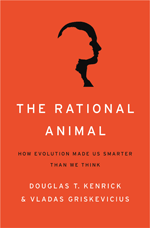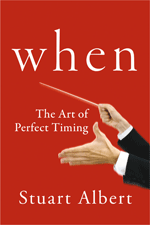
New Books by Carlson School Faculty Member
Sunday, September 1, 2013
The Rational Animal
A new book digs into the mystery of our seemingly irrational choices.
Why do people buy cars they can’t afford, gorge themselves on calories they don’t need, and plow cash into something—the lottery—with an expected negative 80 percent return rate?
Those are some of the questions that McKnight Associate Professor of Marketing and Psychology Vladas Griskevicius explores in his new book, The Rational Animal.
As Griskevicius notes, while such actions may seem like proof of human foolishness, they actually reflect a deeper wisdom.
“Economists and psychologists have long assumed that humans seek a single broad goal, such as to feel good or to maximize benefits,” he says. “The Rational Animal challenges this prevailing view by arguing that our choices, though sometimes puzzling, are actually well-designed to serve deep-seated evolutionary goals. All humans pursue several different evolutionary goals, such as attaining status, caring for family, acquiring a mate, and protecting themselves from danger.
“Once we start looking at modern choices through the lens of our ancestral goals, many decisions that appear foolish at the surface level turn out to be smart at a deeper evolutionary level,” he adds. “Behavior that is economically irrational is often evolutionarily wise. For example, going broke to buy a new car may not be economically sensible, but it can be evolutionarily successful. Having a luxurious car, for example, can make a man more attractive to women, which pays dividends when it comes to reproductive success.”
When: The Art of Perfect Timing
A glimpse at the structures that underlie questions of timing.
Whether you are making high-stakes business decisions or personal choices, you must decide not only what to do, but when to do it. Act too early or too late, and the results can be disappointing—or even disastrous. But how can you know when the time is right?
In When, timing expert and Strategic Management and Entrepreneurship Associate Professor Stuart Albert presents a fresh, counter intuitive, and above all, practical approach to dealing with timing issues. Albert shows that good timing is not just a matter of luck, intuition, or past experience—all of which may be unreliable—but requires skill. When teaches the tools and methods needed to build and use that skill, equipping you to choose and use timing to your (competitive) advantage.
At the heart of the book is Albert’s timing analysis method, based on a decades-long investigation of more than 2,000 timing issues and errors. When examines in depth the six key elements of timing analysis: Sequence, Temporal Punctuation, Interval/Duration, Rate, Shape, and Polyphony, and how they fit together in timing design. Examples from the worlds of business, warfare, medicine, sports, entertainment, and the arts bring those elements to life, clearly illustrating how to find timing patterns and craft a subtle, sophisticated, specific—and effective—course of action, whether in business or in everyday life.
Engaging and pragmatic, When will show you that, regardless of the work you do or the life you live, time can be on your side. When is now available on Amazon.

